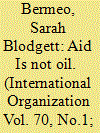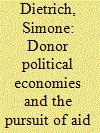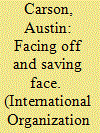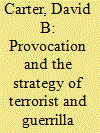|
|
|
Sort Order |
|
|
|
Items / Page
|
|
|
|
|
|
|
| Srl | Item |
| 1 |
ID:
145008


|
|
|
|
|
| Summary/Abstract |
Recent articles conclude that foreign aid, like other nontax resources, inhibits political change in authoritarian regimes. This article challenges both the negative political effects of aid and the similarity of aid to other resources. It develops a model incorporating changing donor preferences and the heterogeneity of foreign aid. Consistent with the model's predictions, an empirical test for the period 1973–2010 shows that, on average, the negative relationship between aid and the likelihood of democratic change is confined to the Cold War period. However, in the post–Cold War period, nondemocratic recipients of particular strategic importance can still use aid to thwart change. The relationship between oil revenue and democratic change does not follow the same pattern over time or across recipients. This supports the conclusion that aid has different properties than other, fungible, resources.
|
|
|
|
|
|
|
|
|
|
|
|
|
|
|
|
| 2 |
ID:
145010


|
|
|
|
|
| Summary/Abstract |
In response to corruption and inefficient state institutions in recipient countries, some foreign aid donors outsource the delivery of aid to nonstate development actors. Other donor governments continue to support state management of aid, seeking to strengthen recipient states. These cross-donor differences can be attributed in large measure to different national orientations about the appropriate role of the state in public service delivery. Countries that place a high premium on market efficiency (for example, the United States, United Kingdom, Sweden) will outsource aid delivery in poorly governed recipient countries to improve the likelihood that aid reaches the intended beneficiaries of services. In contrast, states whose political economies emphasize a strong state in service provision (for example, France, Germany, Japan) continue to support state provision. This argument is borne out by a variety of tests, including statistical analysis of dyadic time-series cross-section aid allocation data and individual-level survey data on a cross-national sample of senior foreign aid officials. To understand different aid policies, one needs to understand the political economies of donors.
|
|
|
|
|
|
|
|
|
|
|
|
|
|
|
|
| 3 |
ID:
145011


|
|
|
|
|
| Summary/Abstract |
States pursue their cooperative and competitive goals using both public and private policy tools. Yet there is a profound mismatch between the depth, variety, and importance of covert activity and what scholars of International Relations (IR) know about it. This article addresses this gap by analyzing how adversaries struggle for influence within the covert sphere, why they often retreat to it, and when they abandon it. It focuses on secrecy among adversaries intervening in local conflicts and develops a theory about secrecy's utility as a device for creating sustainable limits in war. Drawing on insights about secrecy and face-work from the sociologist Erving Goffman, I show that major powers individually and collectively conceal evidence of foreign involvement when the danger of unintended conflict escalation is acute. Doing so creates a kind of “backstage” in which adversaries can exceed limits on war without stimulating hard-to-resist pressure to escalate further. An important payoff of the theory is making sense of puzzling cases of forbearance: even though adversaries often know about their opponent's covert activity, they often abstain from publicizing it. Such “tacit collusion” arises when both sides seek to manage escalation risks even as they compete for power and refuse to capitulate. The article evaluates the theory via several nested cases of external intervention in the Korean War. Drawing on newly available materials documenting the covert air war between secretly deployed Soviet pilots and Western forces, the cases show how adversaries can successfully limit war by concealing activity from outside audiences. Beyond highlighting the promise in studying the covert realm in world politics, the article has important implications for scholarship on coercive bargaining, reputation, state uses of secrecy, and how regime type influences conflict behavior.
|
|
|
|
|
|
|
|
|
|
|
|
|
|
|
|
| 4 |
ID:
145012


|
|
|
|
|
| Summary/Abstract |
Violent nonstate groups are usually weaker than the states they target. Theory suggests that groups carefully condition their choice of tactics on anticipated state response. Yet scholars know very little about whether and how groups strategically plan attacks in anticipation of state response. Scholars do not know if and under what conditions groups employ violent tactics to provoke or avoid a forceful state response, although extant theory is consistent with both possibilities. Relatedly, there is little systematic evidence about why groups choose terrorist or guerrilla tactics and how this choice relates to anticipated state response. I develop a theoretical and empirical model of the interaction between groups and states that generates unique evidence on all three fronts. Using data on attacks in Western Europe from 1950 to 2004, I show that guerrilla attacks are sometimes associated with provoking forceful state response, whereas terrorist attacks are generally associated with avoiding forceful response. Groups effectively choose their tactics to avoid forceful state responses that are too damaging for themselves but provoke forceful responses that disproportionately harm civilians. These findings survive several robustness and model specification tests.
|
|
|
|
|
|
|
|
|
|
|
|
|
|
|
|
| 5 |
ID:
145016


|
|
|
|
|
| Summary/Abstract |
Britain's 1931 suspension of the gold standard remains one of the most shocking policy shifts of the past century. Conventional explanations focus on changing international conditions alongside the rise of social democracy: when Britons refused to shoulder the increasing costs of defending the exchange rate, the Bank of England was “forced” to abandon the gold standard. This article refocuses attention on policy-makers’ causal ideas at critical moments. Drawing on numerous primary sources held in several archives, it reveals a cleavage within the Bank over the appropriate response to the flight from sterling. Following the nervous collapse of the Bank's governor, the deputy governor shifted the Bank's strategy from making defensive rate hikes to pursuing fiscal austerity. He then “temporarily” suspended gold convertibility in a gambit to forestall the election he (incorrectly) assumed would unseat the gold standard's supporters in Parliament. When the unintended experiment with a managed float proved successful, Keynes was able to persuade policy-makers to embrace the new exchange rate regime.
|
|
|
|
|
|
|
|
|
|
|
|
|
|
|
|
| 6 |
ID:
145018


|
|
|
|
|
| Summary/Abstract |
Conditions on aid agreements aim to increase aid effectiveness, and are, therefore, an important component of aid agreements. Yet little is known about why aid-recipient governments comply with these conditions. Some scholars have suggested a strategic-importance hypothesis: recipients comply when donors enforce conditions—and donors enforce conditions when recipients are not strategically important. However, there are many cases where strategically important countries comply with conditions and strategically unimportant countries fail to do so. We argue that to explain compliance, we must also understand how the desire to maximize revenue from major income sources, such as FDI and natural resource rents, changes the recipient's incentive to comply. Using data on World Bank records of compliance from 1964 to 2010, we find strong support for our hypotheses even after accounting for different model specifications and potential endogeneity. Paradoxically, donors can secure compliance from recipients for reasons unrelated to the promise of additional aid.
|
|
|
|
|
|
|
|
|
|
|
|
|
|
|
|
| 7 |
ID:
145009


|
|
|
|
|
| Summary/Abstract |
Although there is a deep and wide consensus that international conflict over territory is especially common and destructive, there is less agreement over what it is about territory that leads to these outcomes. Understanding the role of territory in international conflict requires complementing realist and materialist understandings of the value of territory with one grounded in the constructivist theories that dominate studies of nationalism and geography. Doing so recognizes that homeland territoriality, because it raises the value of a specific territory and provides an imperative to establish sovereignty over it, plays a distinctive role in driving international conflict. This article presents a systematic, replicable operationalization of the homeland status of territory that, because it is consistent with constructivist theories of nationalism, can be used to integrate constructivist understandings of the role of territory into quantitative studies of territorial conflict. This measure is then used to test the implication that the loss of subjectively defined homeland territory increases the likelihood of international conflict relative to the loss of nonhomeland territory. The findings that dividing homelands is especially likely to lead to conflict are corroborated by a second novel measure of the homeland status of territory that is based on the identification of co-ethnics in a territory before the border was drawn.
|
|
|
|
|
|
|
|
|
|
|
|
|
|
|
|
|
|
|
|
|